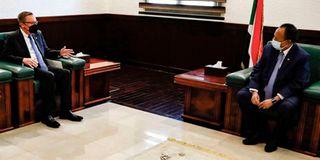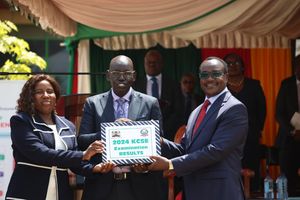US warns Sudan against disrupting transitional system

Sudan's Prime Minister Abdalla Hamdok (right) meets with the US Special Envoy for the Horn of Africa Jeffrey Feltman in the capital Khartoum on September 29, 2021.
United States of America has warned Sudan against disrupting the transitional system. Washington has threatened to stop bilateral aid, including military and security cooperation between the US and Sudan.
In a statement on Saturday, the US Department of State said that the Special Envoy for the Horn of Africa, Jeffrey Feltman, held talks in Khartoum during his three-day visit to highlight “the United States’ unwavering commitment to Sudan’s continued political transition.”
During his meetings with Prime Minister Abdullah Hamdok and the members of the Cabinet, Sovereign Council Chairman Abdul Fattah al-Burhan and members of the Sovereign Council, and other political stakeholders, Mr Feltman expressed United States’ dedication to continued political and economic support as Sudan’s transition process.
The envoy told Khartoum officials, "Deviating from this path and failing to meet key parameters will jeopardise Sudan's bilateral relationship with the United States, including significant American aid, as well as prospects for security cooperation to modernise the Sudanese armed forces, American support in international financial institutions, and debt relief."
Constitutional Declaration of 2019
Mr Feltman said: “The support provided to Sudan is linked to the agreement stipulated in the Constitutional Declaration of 2019, and the Juba Peace Agreement of 2020". He stressed the US' keenness to maintain political and economic support for Sudan.
The Foreign Ministry said that the Special Envoy encouraged the Cabinet and the Sovereign cancel, the Forces of Freedom and Change, and other stakeholders to “assume their responsibilities at this historic moment and reassure the Sudanese people that the aspirations of the revolution will be fulfilled to avoid the brinkmanship and mutual accusations and to make rapid progress on key parameters in the constitutional declaration that would achieve stability in the transitional phase”.
Among those requirements is the need to reach consensus on a date for transferring the presidency of the Sovereign Council to the civilian wing and to start a comprehensive process to develop a new vision for Sudanese national security.
The country is also required to guide the security sector reform agenda under civilian authority with recognition of the integrated role of the armed forces in Sudan and the formation of the Transitional Legislative Council with the establishment of the legal framework the institutionalisation of free and fair elections, Restructuring the Constitutional Court and establishing mechanisms for transitional justice.
The Foreign Ministry statement pointed out the importance of the Sovereign Council working collectively in performing the tasks entrusted to it under the Constitutional Declaration.
Negotiated ceasefire
Mr Feltman thanked Prime Minister Hamdok, in his role as chairman of (IGAD), for his commitment to promoting a peaceful resolution of the conflict in Ethiopia. The two leaders agreed on the urgency of a negotiated ceasefire and unhindered humanitarian access to all those who are suffering.
The US envoy to the Horn of Africa visited Sudan from September 28 to October 1, a week after an attempted coup that raised tension between the civilian and military components of the Sovereignty Council, which handles the affairs of the country.
Sudanese authorities said that coup plotters loyal to ousted President Omar al-Bashir were trying to thwart the revolution that ousted al-Bashir from power in 2019 and led to the transition to democracy.
The Sudanese army is supposed to share power for nearly five years with civilians led by the Forces of Freedom and Change coalition, which sparked the protests in December 2018.
It is scheduled to hand over power to a civilian authority following free elections at the end of the transitional period.





